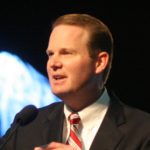The church cannot flourish without strong male leadership, a Southern Baptist seminary president said at a recent gathering promoting the idea that men and women are created for different and complementary roles in marriage and church.
“Where there is a dearth of mature, godly men in the church, that church will always suffer,” Jason Allen, president of Midwestern Baptist Theological Seminary in Kansas City, Mo., said in a message at the annual conference of the Council for Biblical Manhood and Womanhood April 11-12 in Louisville, Ky. “The church in want of biblical, masculine leadership and service is always an anemic church.”
Speaking in a message titled Complementarity and the Disappearance of Men now viewable online, Allen said in many churches “biblical men are like corks of testosterone bobbing in ponds of estrogen.”
Pop theology, he said, offers opposite but equally erroneous ideas.
“To be a better Christian man, men should become more like women,” Allen introduced one argument, “more thoughtful, more caring, more romantic, always mindful of expressions of romance and dutifully carrying them out.”
“The other pole alternately at times sounds much like a beer commercial, frankly,” he said — “glorify machismo, gruffness and honoring the strong arm.”
Through it all, Allen said “the church must recover biblical manhood, Christian masculinity — what we might think of sanctified testosterone.”
Allen, who earned both his M.Div. and Ph.D. degrees from Southern Baptist Theological Seminary in Louisville, Ky., urged preachers to consistently and confidently talk about “the beauty of complementarity,”
“Never say things like when my wife got married we covenanted that I would make the major decisions and she would make the minor ones and in 30 years of marriage we’ve never had a major decision face us,” he said. “When we do that, we are undermining what biblical leadership and biblical manhood is, and if we do that we ought not be surprised when on the back end of those comments we look at congregations that are bereft of male leaders.”
Allen said preachers also must be committed to preaching “the text of Scripture.
“When we preach weak sermons we make weak men,” he said. “Shallow preaching produces shallow men. Small preaching never leads to great commitment. Men long for a higher calling, a higher purpose, and let us give them something that is grander than fantasy football and X-Box.”
Allen further advised preachers to “maintain clarity in our churches with regard to gender roles in both form and function.”
“It is better to tell your church simply we don’t have a qualified man at this point for that position than to contort God’s word by playing word games with titles,” he said. “We don’t have a qualified man to the be the minister for this area of the church so what we’ll do is we’ll call it a director and we’ll put a female in charge of that role that ought to be reserved for a man.”
“Biblical complementarity is not fundamentally about what opportunities women must forego but what responsibilities men must take up,” he said. “Complementarianism is not fundamentally what women can do but about what men must do.”
Allen said male leadership must be both “in form and in function.”
“Male leadership positions in form who always manage to decide the way the women in the church pressure them to, that is not male leadership,” he said.
Allen said preachers should maintain “gender distinction” at all ages throughout the church. “Not segregation but distinction,” intentionally building an “esprit de corps” among boys and men at all stages of life.
Finally, Allen said preachers must “intentionally enlist, equip and empower men into male leadership in our churches.”
“The red herring of women must lead because men aren’t ready, we must make that an extinct species,” he declared.
Previous story:
Theologian says gender identity a ‘last wall’ in civilization

